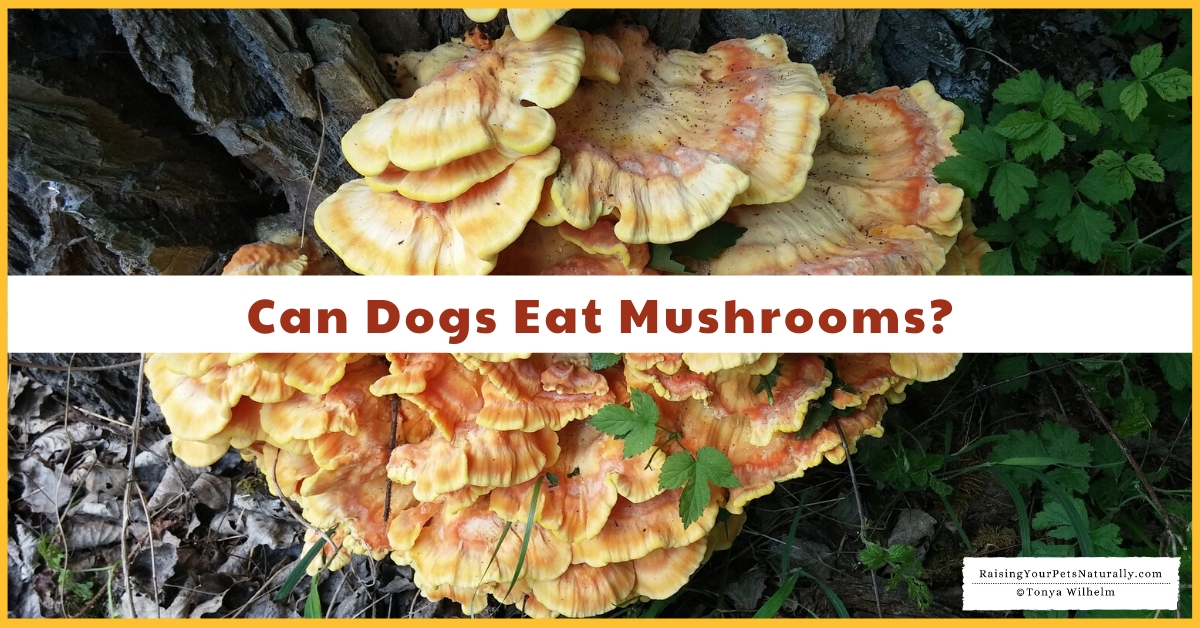Are Mushrooms Good for Dogs?

(Updated 5/2/23)
These fungi can be edible, poisonous, medicinal, and cause hallucinations. It’s important to keep reading before picking a random mushroom from your yard and feeding it to your dog.
Mushrooms have been used for centuries for both their nutritional benefits and as a natural remedy. Mushrooms are packed with minerals, vitamins, protein, enzymes, glycogen, beta-D-glucans, and antioxidants. These little gems also help to boost the immune system. According to the National Cancer Institute, the antioxidant content in mushrooms may help prevent various forms of cancer.
Dr. Michelle Burch from Safe Hounds Pet Insurance explains, “Medicinal mushrooms are mainly found in the class Basidiomycetes, with a few found in the class Ascomycetes. Some examples include maitake (Grifola frondosa, Polyporous umbellatus, Grifola umbellatus, and Boletus frondosus), shiitake (Lentinus edodes), reishi (Gandoerma lucidum), cordyceps (Cordyceps ophioglossoides), and turkey tail (Trametes versicolor).”
Dr. Burch continued, “These medicinal mushrooms are used in various conditions for their anticancer, anti-inflammatory, and immune-boosting effects. Specific diseases treated with medicine mushrooms include diabetes, liver disease, high blood pressure, arthritis, lung disease, infection, gastrointestinal disease, hemangiosarcoma, and nerve disease.”
University of Pennsylvania School of Veterinary Medicine found Dogs with cancer that were treated with a mushroom compound had the longest survival times ever reported for dogs with the disease.
Some medicinal mushrooms for dogs that I include in Dexter’s diet include Reishi, Shiitake, Maitake, Turkey Tail, Cordyceps, Chaga, Lion’s Mane, King Trumpet, and Himematsutake. As with all foods, how the mushrooms are raised is extremely important. This is definitely one ingredient I would want to be organic and, ideally, third-party tested. Non-organic mushrooms are notorious for carrying heavy metals and pesticides.
Feeding your dog fresh, organic mushrooms isn’t a bad thing, but, if you are trying to supply your dog with the most health benefits, dried, a powder form, or tincture would be best. The sheer quantity of fresh mushrooms you would have to feed vs. condensed form may be overwhelming to your dog’s system. Not to say I haven’t added a bunch of sauteed or steamed mushrooms to Dexter’s meals, because I have.
When preparing your dog’s mushrooms, it’s best that they are cooked, which offers more medicinal benefits. That hard outside wall of a mushroom is called chitin. It’s not easily digested raw. Cooking the mushrooms prior to feeding will break down that wall, making it easier for your dog to digest.
Do be careful of mushrooms that are toxic to dogs. Your best bet is to purchase your dog’s medicinal mushrooms vs. harvesting them yourself. It is also important to ensure your dog is not eating mushrooms in your yard or on a walk. This is another reason why I feel dogs should be supervised while in their fenced yard.
Dr. Karen Becker states, “Since pets (typically dogs) come across wild mushrooms during walks and other outdoor activities, especially if you live in a region with lots of moisture, it’s important to take extra care to keep furry family members away from areas where mushrooms might be sprouting.”
According to the North American Mycological Association (NAMA), dogs tend to eat two deadly mushroom species; Amanita phalloides and Inocybe. The attraction to these mushrooms is likely because they have a fishy odor.
Dr. Burch said, “Toxic mushrooms can cause liver damage, neurological disease, gastrointestinal upset, and kidney damage. Amanita spp., Galerina spp., and Lepiota spp. will cause fatal irreversible liver failure. Psilocybe spp. and Gyromitra spp. will cause nervous system abnormalities with incoordination, disorientation, weakness, tremors, seizures, hallucinations, and vocalization.”
She continued by saying, “Muscarinic mushrooms will cause gastrointestinal upset with vomiting, diarrhea, weakness, and dehydration. Cortinarius spp. will cause damage to the kidneys resulting in increased thirst and urination, vomiting, nausea, and dehydration. Thankfully the Cortinarius spp. is rare in the United States, but ingestion of this species will severely damage the kidneys, resulting in a guarded prognosis.”
If you think your pet ate a wild mushroom, contact your pet’s veterinarian immediately.
I have been rotating organic mushroom powder blends and mushroom tinctures into Dexter’s meals for many years. I do an on-off. One week on one variety, one week off then a new variety. That’s just the way I roll.
Your questions or comments are welcome below.
Are you looking for even more ways to stay up to date with Raising Your Pets Naturally? Sign up for the newsletter for more tips and promotions. Don’t forget to be social and Like, Follow and Subscribe. Comments below are always welcome.
Facebook Twitter Pinterest Instagram YouTube
 |
 |
 |
 |



